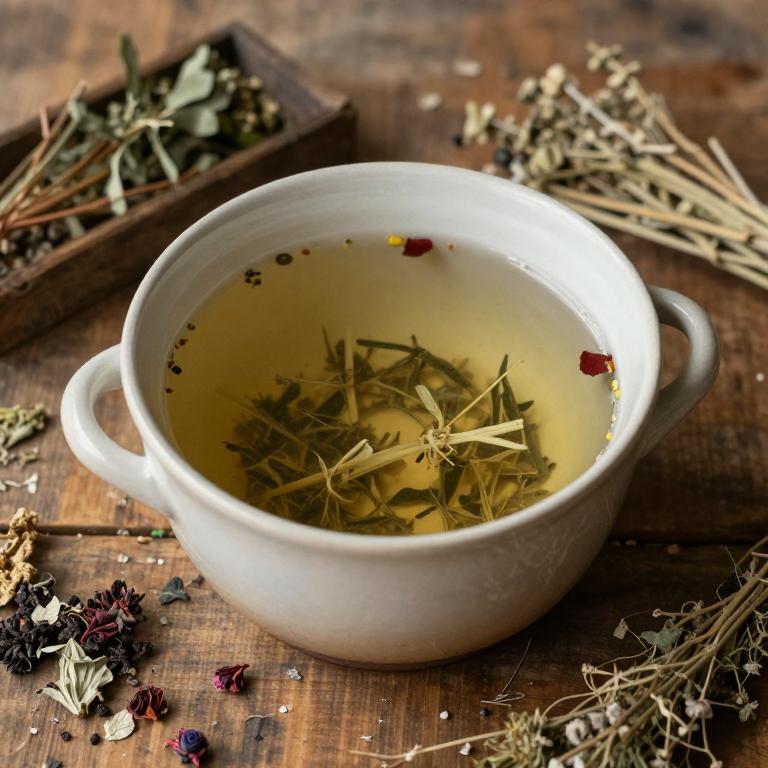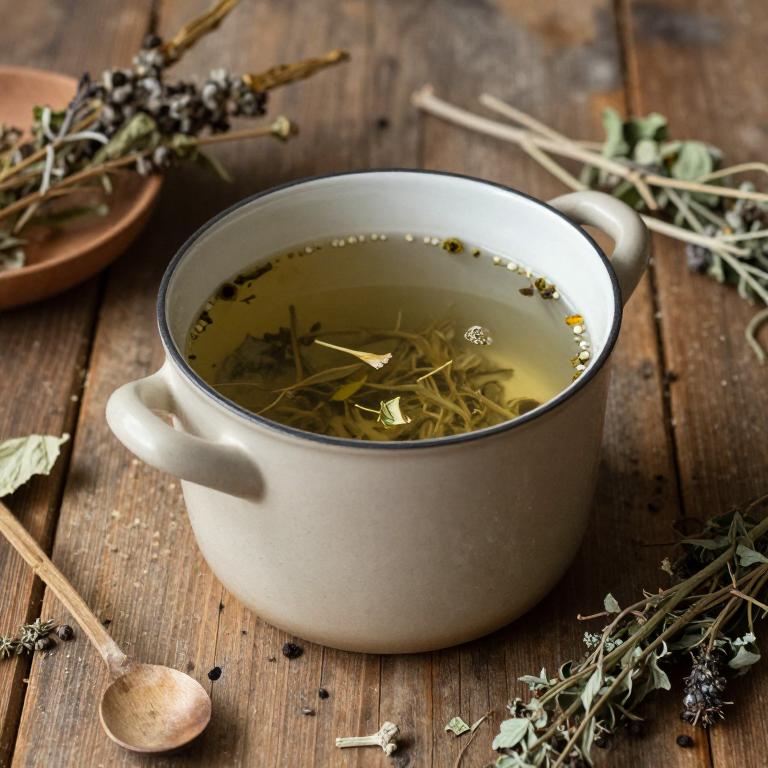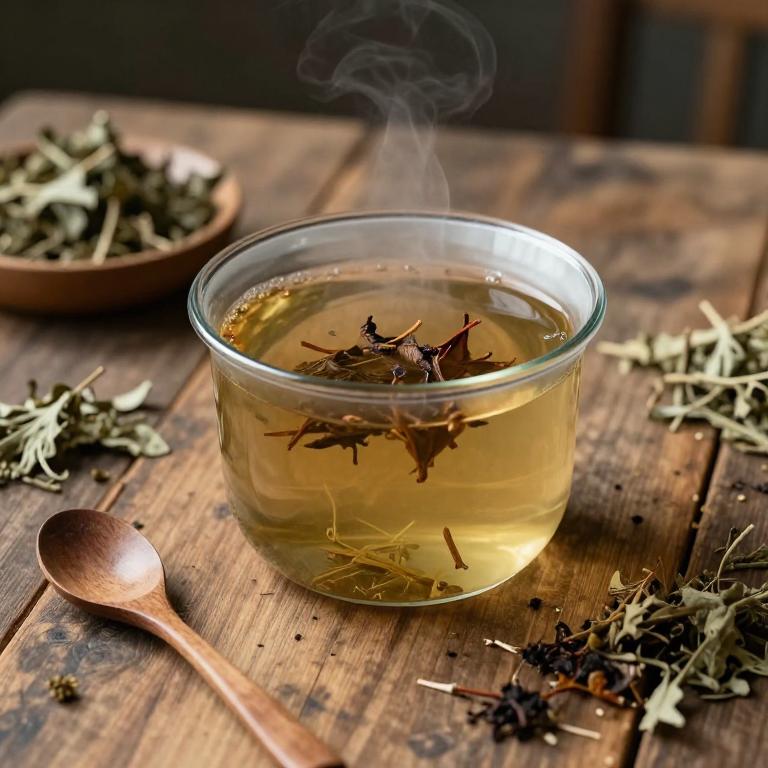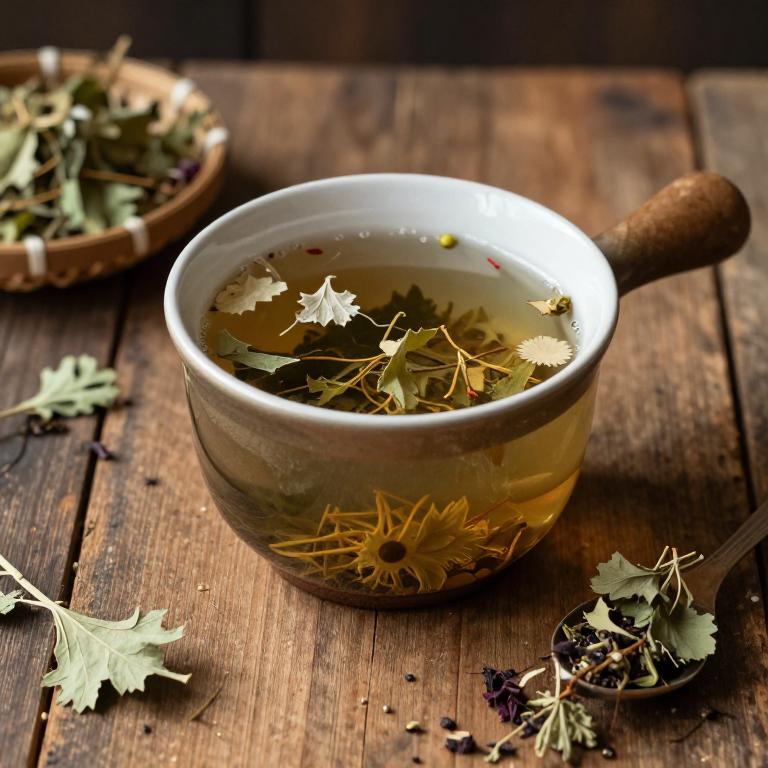10 Best Herbal Decoctions For Over Bleeding During Periods

Herbal decoctions have been traditionally used to manage excessive bleeding during menstruation by balancing the body's internal systems and promoting hormonal harmony.
Commonly used herbs include nettle, shepherd's purse, and yarrow, which are known for their astringent and hemostatic properties. These herbs are typically simmered in water to extract their active compounds, making them easy to consume and absorb. Regular consumption of such decoctions can help reduce menstrual flow and alleviate associated symptoms like cramping and fatigue.
However, it is important to consult with a qualified herbalist or healthcare provider before starting any herbal regimen, especially for those with underlying health conditions or who are taking other medications.
Table of Contents
- 1. Yarrow (Achillea millefolium)
- 2. Field horsetail (Equisetum arvense)
- 3. Black cohosh (Cimicifuga racemosa)
- 4. St. john's wort (Hypericum perforatum)
- 5. Sanguisorba (Sanguisorba officinalis)
- 6. Stinging nettle (Urtica dioica)
- 7. Chaste tree (Vitex agnus-castus)
- 8. Marigold (Calendula officinalis)
- 9. Thyme (Thymus vulgaris)
- 10. Common hawthorn (Crataegus monogyna)
1. Yarrow (Achillea millefolium)

Achillea millefolium, commonly known as yarrow, has been traditionally used in herbal medicine to address excessive menstrual bleeding.
Its decoctions, made by boiling the dried leaves and flowers, are believed to have hemostatic properties that help reduce blood loss during menstruation. The herb contains compounds such as azulene and volatile oils that may support uterine tone and regulate menstrual flow. However, it is important to consult a healthcare provider before using yarrow, as it can interact with certain medications and may not be suitable for all individuals.
While some studies suggest its efficacy, more research is needed to fully understand its mechanisms and safety profile in treating menorrhagia.
2. Field horsetail (Equisetum arvense)

Equisetum arvense, commonly known as field horsetail, has been traditionally used in herbal medicine for its astringent properties, which may help in reducing excessive menstrual bleeding.
The decoction of Equisetum arvense is prepared by boiling the dried stems in water, and it is believed to help tone the uterine tissues and reduce hemorrhage. While some studies suggest that the high silica content in horsetail may support tissue healing, more research is needed to confirm its efficacy for managing menorrhagia. It is often used in combination with other herbs like yarrow or shepherd's purse in traditional formulations.
However, it is important to consult a qualified herbalist or healthcare provider before using Equisetum arvense to ensure safety and appropriateness for individual health conditions.
3. Black cohosh (Cimicifuga racemosa)

Cimicifuga racemosa, also known as black cohosh, is commonly used in herbal medicine to address symptoms related to hormonal imbalances, including heavy menstrual bleeding.
Herbal decoctions made from the roots of Cimicifuga racemosa are traditionally prepared by boiling the dried root in water for several hours to extract its active compounds. These decoctions are believed to support the female reproductive system and may help regulate menstrual flow by influencing hormonal activity. However, it is important to consult a qualified healthcare provider before using Cimicifuga racemosa, as it may interact with certain medications or have side effects in some individuals.
While some studies suggest potential benefits, more research is needed to fully understand its efficacy and safety for managing excessive menstrual bleeding.
4. St. john's wort (Hypericum perforatum)

Hypericum perforatum, commonly known as St. John's Wort, is traditionally used in herbal medicine for its potential benefits in managing excessive menstrual bleeding.
Herbal decoctions made from the dried flowers and leaves of Hypericum perforatum are believed to have astringent properties that may help reduce uterine bleeding by strengthening blood vessels and promoting clot formation. These decoctions are often prepared by simmering the plant material in water for an extended period to extract its active compounds. While some studies suggest that St. John's Wort may have mild hemostatic effects, its use for heavy menstrual bleeding should be approached with caution and under the guidance of a qualified healthcare provider.
It is important to note that hypericum perforatum can interact with various medications, so it is crucial to consult a professional before using it for this purpose.
5. Sanguisorba (Sanguisorba officinalis)

Sanguisorba officinalis, commonly known as sweet flag or dropwort, has been traditionally used in herbal medicine for its astringent and hemostatic properties.
Herbal decoctions made from its roots are often prepared by simmering the dried root in water for several hours to extract its active compounds. These decoctions are believed to help reduce excessive menstrual bleeding by strengthening blood vessels and promoting coagulation. The herb contains tannins and other bioactive compounds that contribute to its ability to regulate menstrual flow.
While it is generally considered safe, it is advisable to consult a healthcare provider before using it, especially for individuals with existing health conditions or those taking other medications.
6. Stinging nettle (Urtica dioica)

Urtica dioica, commonly known as stinging nettle, has been traditionally used in herbal medicine for its potential to support menstrual health.
A decoction made from the leaves and stems of Urtica dioica is often prepared by simmering the dried plant material in water for an extended period to extract its beneficial compounds. This herbal preparation is believed to help regulate menstrual flow and may be beneficial for individuals experiencing over-bleeding during their periods. The high concentration of minerals such as iron, silica, and calcium in stinging nettle may contribute to its effectiveness in supporting blood health and reducing excessive menstrual bleeding.
However, it is important to consult with a qualified herbalist or healthcare provider before using Urtica dioica, especially during menstruation, to ensure it is appropriate for individual health needs.
7. Chaste tree (Vitex agnus-castus)

Vitex agnus-castus, commonly known as chasteberry, has been traditionally used to support hormonal balance and may help reduce excessive menstrual bleeding.
Herbal decoctions made from the dried fruits of the Vitex agnus-castus plant are often prepared by simmering the plant material in water for several hours to extract its active compounds. These decoctions are believed to influence the pituitary gland and regulate the menstrual cycle, potentially reducing the flow of blood during periods. However, it is important to consult a qualified herbalist or healthcare provider before use, as individual responses can vary and interactions with other medications may occur.
While some studies suggest potential benefits, more clinical research is needed to fully establish its efficacy and safety for managing heavy menstrual bleeding.
8. Marigold (Calendula officinalis)

Calendula officinalis, commonly known as pot marigold, has been traditionally used in herbal medicine for its anti-inflammatory and astringent properties.
Herbal decoctions made from calendula officinalis can help manage excessive menstrual bleeding by promoting uterine tone and reducing blood vessel permeability. The active compounds in calendula, such as flavonoids and triterpenes, contribute to its ability to support menstrual health and reduce hemorrhage. However, it is important to consult with a healthcare provider before using calendula decoctions, especially for individuals with existing health conditions or those taking medications.
While calendula may offer natural support for managing over-bleeding, it should not replace professional medical advice or treatment.
9. Thyme (Thymus vulgaris)

Thymus vulgaris, commonly known as thyme, has been traditionally used in herbal medicine for its potential to support hormonal balance and reduce excessive menstrual bleeding.
Its decoctions, made by simmering the dried herb in water, are believed to have astringent and antispasmodic properties that may help regulate menstrual flow. Some studies suggest that thyme contains compounds like thymol and carvacrol, which may influence uterine contractions and blood vessel integrity. While anecdotal evidence supports its use for managing heavy periods, more scientific research is needed to confirm its efficacy and safety for this specific application.
As with any herbal remedy, it is advisable to consult a healthcare provider before using thyme decoctions, especially for individuals with existing health conditions or those taking medications.
10. Common hawthorn (Crataegus monogyna)

Crataegus monogyna, commonly known as the common hawthorn, has been traditionally used in herbal medicine for its potential to address excessive menstrual bleeding.
Herbal decoctions made from the dried flowers and leaves of Crataegus monogyna are believed to possess astringent and hemostatic properties that may help reduce uterine bleeding. These decoctions are often prepared by simmering the plant material in water for an extended period to extract the active compounds. In traditional herbal practices, they are sometimes combined with other herbs such as yarrow or nettle to enhance their effectiveness.
However, it is important to consult a qualified herbalist or healthcare provider before using these decoctions, as they may interact with other medications or have contraindications for certain individuals.